With the start of a new year, now is a great time to focus on ways to improve your finances in 2023. Pure’s Associate Advisor, Michael Chipperfield, CFP®, AIF® talks about plans and strategies to improve your financial health.
FREE GUIDE | Financial New Year’s Resolutions: Tips for Getting Your Finances in Order
Transcript
Ways to Improve your Finances in 2023
With the start of a new year, now is a great time to be focusing on ways to improve your Finances in 2023. In order to start the year by making positive changes to your finances, consider creating a list of to-dos or goals, and then putting a plan in place to achieve them. Let’s take a look at some of the top ways to make an impact this year.
First, consider creating a budget for the year. One of the most effective ways to make changes to our spending habits is to first have a solid understanding of what dollars we expect to come in and what dollars we expect to go out. Start with taking inventory of your income sources. For a lot of us that may consist of salary, pensions, Social Security, rental income, or potentially a combination of all those.
Next, determine your expected expenses. This will often include necessary living expenses, mortgage payments, retirement savings and any other planned discretionary spending that you have. You may also want to consider adding an additional buffer for any emergencies or unexpected expenses that may arise through the year.
Next, review your debt and make sure that you have a plan in place to manage it. As a rule of thumb, you should aim to keep your monthly debt payments less than 30% of your pre-tax income. For many, one of the largest sources of debt might be a mortgage, but if you have more than one source of debt, consider refinancing or consolidating some of the loans if you can achieve a lower interest rate. If you feel like debt is starting to get out of control, review your budget and see where you can make room to pay down the debt at a quicker rate.
Third, with tax season around the corner, another great way to improve your finances in 2023 is to review your tax situation. Keep in mind that many tax forms become available in February and March, so beginning to put together a draft of your tax return as soon as possible so that you can be prepared to file your taxes by the April 15th deadline. After you have prepared your 2022 tax return, it’s time to plan for 2023. Take a look at the income that you expect to receive throughout the year and how that will impact your taxes. Keep in mind that if you are taking any distributions from your investment portfolio, the type of the account that you pull the distributions come from may impact your tax liability differently. Of course, if you are expecting that your tax situation is complex, or if you are unsure how your income is going to be taxed, it is recommended that you talk to a tax advisor.
Fourth, review your 2023 investment plan and strategy. Because everyone’s financial plan and situation is unique, start by determining your goals so that you can figure out what you need from your investments. There are many different ways and strategies to invest but be sure to have a well thought out and clear plan that you can implement. It is also important to make sure that your investment plan has a consistent strategy and is well diversified to help you navigate different market conditions. Diversification can be achieved through owning multiple stocks and bonds, mutual funds and ETF’s, or looking at the market through different lenses such as company size, market sector, or regional exposure. At the end of the day, make sure that your investment strategy is well suited to your financial plan, and is one that you can stay disciplined with and stick to over time.
Finally, make sure that you have your estate plan in order. This is an area that often gets overlooked or pushed to the back burner because, quite frankly, it’s not the happiest topic to discuss. Statistics say that as of 2021, only 33% of Americans have a trust or will. If you don’t have an estate plan, it’s a great time to sit down and think about what you want to have happen with your assets or who you want to step in and make decisions on your behalf if you are unable to make them for yourself. This process will take time, but once you have thought through plan, schedule a meeting with an estate planning attorney and discuss if a trust, will, or other documents should be drafted. By having a well thought out and documented plan, you can ensure your beneficiaries will receive your assets in the most tax efficient and timely manner.
With a new year, brings new opportunities. Don’t wait to address these areas to improve your finances in 2023.
Subscribe to our YouTube channel.
IMPORTANT DISCLOSURES:
• Investment Advisory and Financial Planning Services are offered through Pure Financial Advisors, LLC, a Registered Investment Advisor.
• Pure Financial Advisors LLC does not offer tax or legal advice. Consult with your tax advisor or attorney regarding specific situations.
• Opinions expressed are subject to change without notice and are not intended as investment advice or to predict future performance.
• Investing involves risk including the potential loss of principal. No investment strategy can guarantee a profit or protect against loss in periods of declining values.
• All information is believed to be from reliable sources; however, we make no representation as to its completeness or accuracy.
• Intended for educational purposes only and are not intended as individualized advice or a guarantee that you will achieve a desired result. Before implementing any strategies discussed you should consult your tax and financial advisors.
CFP® – The CERTIFIED FINANCIAL PLANNER™ certification is by the Certified Financial Planner Board of Standards, Inc. To attain the right to use the CFP® designation, an individual must satisfactorily fulfill education, experience and ethics requirements as well as pass a comprehensive exam. Thirty hours of continuing education is required every two years to maintain the designation.
AIF® – Accredited Investment Fiduciary designation is administered by the Center for Fiduciary Studies fi360. To receive the AIF Designation, an individual must meet prerequisite criteria, complete a training program, and pass a comprehensive examination. Six hours of continuing education is required annually to maintain the designation.











